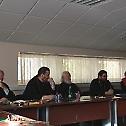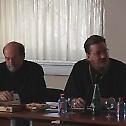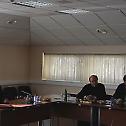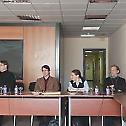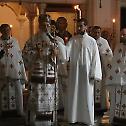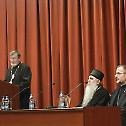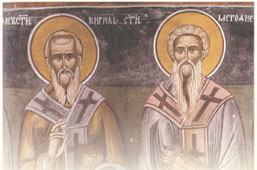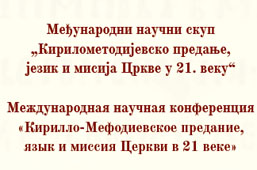Science
Thursday in the first week of Great Lent
6. March 2014 - 10:39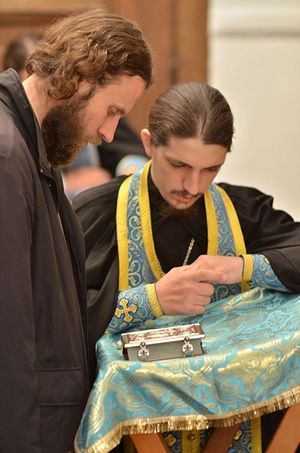 Repentance is a sacrament by which those who confess
Repentance is a sacrament by which those who confess
their sins are invisibly absolved of them by Jesus Christ Himself,
at the priest’s visible expression of forgiveness.
Orthodox Catechesis
During the first week of Great Lent, all Orthodox Christians try to worthily prepare themselves for Communion of the Holy Mysteries of Christ. They first cleanse their souls in the sacrament of confession.
The Lord Jesus Christ said to His disciples, Verily I say unto you, Whatsoever ye shall bind on earth shall be bound in heaven: and whatsoever ye shall loose on earth shall be loosed in heaven (Mt. 18:18). And in another place, He breathed on them, and saith unto them, Receive ye the Holy Ghost: Whose soever sins ye remit, they are remitted unto them; and whose soever sins ye retain, they are retained (Jn. 20:21-23). Fulfilling the Lord’s will, the apostles in turn gave this authority to their successors—the pastors of Christ’s Church, and to this day, all the right-believing Christians who sincerely confess their sins before an Orthodox priest can receive through him the prayer of absolution, forgiveness, and complete remission of sins.
Wednesday of the first week of Great Lent
5. March 2014 - 11:02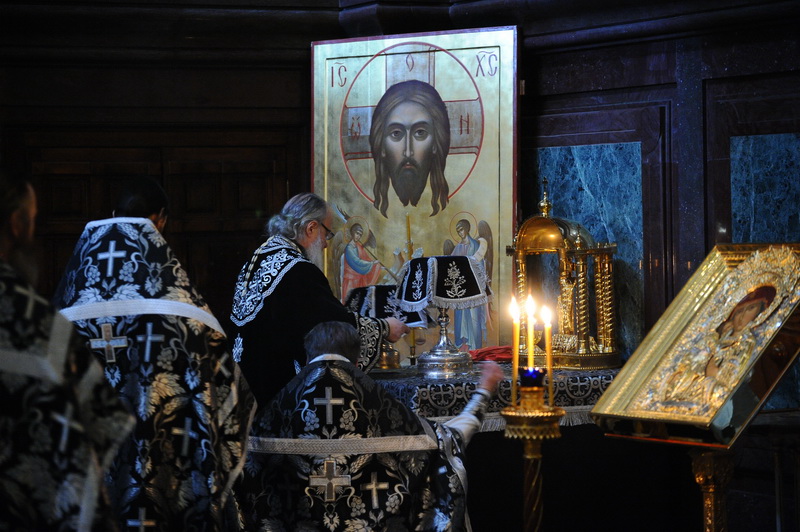 On Wednesdays and Fridays (and on certain feast days) throughout the entire period of Great Lent, the Liturgy of the Presanctified Gifts is celebrated.
On Wednesdays and Fridays (and on certain feast days) throughout the entire period of Great Lent, the Liturgy of the Presanctified Gifts is celebrated.
On the first week of Great Lent, according to tradition, most Orthodox Christians approach the Holy Mysteries of Christ after an especially concentrated preparation for confession and Communion, usually on Saturday or Sunday. Communing at the Liturgy of the Presanctified Gifts during the first week of Great Lent are those who due to illness or some other reasonable cause are not able to fast strictly during the five days of this especially important Lenten week. During the other weeks of Lent, anyone who wishes may receive Communion at the Liturgy of the Presanctified Gifts; this does not include infants, who may be communed only at the full Liturgy.
The Beginning of the Great Lent
3. March 2014 - 10:52 The doors of repentance are opening, Great Lent is beginning. Every year Great Lent is repeated, and each time it brings us great benefit if we spend it as we should. It is a preparation for the life to come and, more immediately, a preparation for the Bright Resurrection.
The doors of repentance are opening, Great Lent is beginning. Every year Great Lent is repeated, and each time it brings us great benefit if we spend it as we should. It is a preparation for the life to come and, more immediately, a preparation for the Bright Resurrection.
Just as a stairway is built into a tall building in order to enable one, by climbing the steps, to easily reach the top, so too, the various days in the year serve as steps for our spiritual ascent.
This is especially true of the days of Great Lent and Holy Pascha.
By means of Great Lent we cleanse ourselves of the filth of sin, and at Holy Pascha we experience the blessedness of Christ's Kingdom that is to come. In climbing a high mountain, one tries to eliminate all unnecessary weight. The less a person carries, the easier it is for him to climb and the higher he is able to climb. So, too, in order to ascend spiritually, it is necessary first of all to free oneself from the weight of sin. This weight is lifted from us through repentance, provided that we banish from ourselves all enmity and forgive each person whom we consider to be at fault before us. Once cleansed and forgiven by God, we then greet the Bright Resurrection of Christ.
St. Tikhon`s Orthodox University will help St. Vladimir`s Seminary in the creation of the Institute of Sacred Arts
30. December 2013 - 13:00The management of St. Tikhon`s Orthodox University (PSTGU) and St. Vladimir`s Seminary of New York, USA met on October 12, 2013, in the Hall of the Academic Council of PSTGU. The University was represented by the Rector Archpriest Vladimir Vorobev, Vice President of Academic Affairs Minister Gennady Egorov, Vice-Rector for International Affairs Archpriest Georgij Orekhanov, Dean of the Faculty of Liturgical Arts Archpriest Alexander Saltykov, Head of the research center of theological history and education Suhova N.Yu., Head of the Department of Systematic Theology and patrology Mikhailov P.B., and the Head of the International Department Nichkova V.V. The delegation of the leading educational institution of the American Orthodox Church was composed by the seminary Dean Archpriest John Behr, Chancellor Archpriest Chad Hatfield and the Head of the publishing house Deacon Gregory Hatrak. Secretary of the Moscow Patriarchate Commission, which regulates student exchange, Fr John Kopejkin has accompanied the delegation of St. Vladimir’s Seminary.
Bodily fasting for the soul's benefit
17. December 2013 - 10:05 The Nativity fast begins on November 14/27, and lasts forty days. The Nativity fast is not as strict as Great Lent or the Dormition fast, and can be compared to the Apostle’s fast. It was instituted by the Church so that we would worthily greet the feast of the Nativity of Christ after having cleansed our hearts by prayer and repentance.
The Nativity fast begins on November 14/27, and lasts forty days. The Nativity fast is not as strict as Great Lent or the Dormition fast, and can be compared to the Apostle’s fast. It was instituted by the Church so that we would worthily greet the feast of the Nativity of Christ after having cleansed our hearts by prayer and repentance.
The establishment of the Nativity fast, like many other long fasts, dates back to the early days of Christianity. Already in the fourth century, St. Ambrose of Milan, Philastrius, and Blessed Augustine recall the Nativity fast in their works. St. Leo the Great wrote about the antiquity of the Nativity fast in the fifth century.
International Scientific Conference – “The Cyrillo-Methodian Tradition, the Language and the Mission of the Church in the XXI Century”
10. December 2013 - 11:42At the Orthodox Theological Faculty of the University in Belgrade, on 6 December 2013 there was held an International Scientific Conference “The Cyrillo-Methodian Tradition, the Language and the Mission of the Church in the XXI Century”.
Before the beginning of the great scientific conference, His Grace Bishop Irinej of Backa celebrated the Hierarchal Divine Liturgy at the chapel of Saint John the Theologian. The dean of the Faculty of Orthodox Theology protopresbyter-stavrophor Professor Dr. Predrag Puzovic opened the conference and Bishop Irinej and protopresbyter-stavrophor Professor Dr. Vladimir Vukasinovic delivered addresses. Director of the Office for Cooperation with Traditional Churches and Religious Communities Dr. Mileta Radojevic also attended the opening ceremony.

